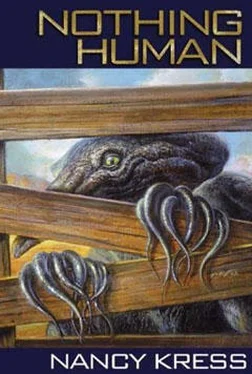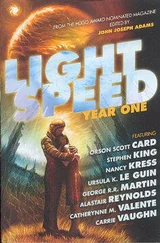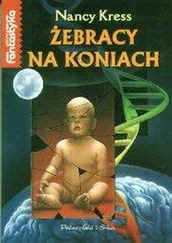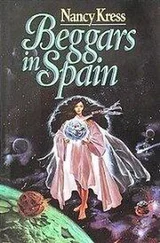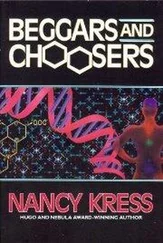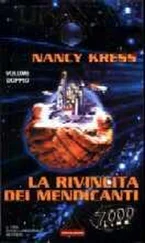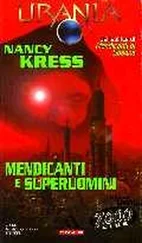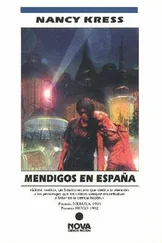The mesquite and yucca gave way to blue grama grasses and yellow columbines. The desert had always had the odd cottonwood or cedar growing along its intermittent waterways, but now these dusty trees were joined by young groves of oak, juniper, and pinion. The arroyos and playas, most of them anyway, stayed wet year-round, and in some years of heavy winter runoff the ranch even developed a temporary through-flowing river, running south down the tilted face of New Mexico toward the border. This past May, Theresa had found a wild rose bush, unheard of here, its delicate pink flowers perfuming the warm air. Antelope moved in from the faraway hills, and bobcats and wild Angora goats.
Carlo and Rosalita Romero were dead by then. Theresa and Cole brought their young family from the East twenty years ago, when times were dangerous and the desert still not arable. It had been safer than the East because it was more remote. Over time, they bought cattle, built outbuildings, expanded the house, planted peanuts and corn and beans and potatoes, some of it even without irrigation. The growing season now extended from April to November. When the biowar ten years ago reduced the Earth’s population to less than two billion, about what it had been in 1900, Tess’s farm had not been reached by any of the blowing, deadly, bioengineered microorganisms.
Patches of desert remained; there was a wide swatch of empty scrub to the south of the ranch. And there were still the flash floods, the terrifying thunderstorms, the wildfires and the infernal daily wind, rising at dawn and dying at dusk like some diurnal atmospheric tantrum. But Theresa knew she had been one of the lucky ones in the unpredictable climate sweepstakes. Their high-tech machinery was breaking down year by year and the world was not manufacturing much by way of replacements, but the farm was making do and increasing its productivity. The United States slowly recovered from the war, putting together some sort of replacement civilization. Nuclear energy, once anathema, powered cities. Theresa Romero and her family were part of that effort. Survivors. Contributors.
None of this would have meant anything at all to Lillie, of course. That young grove of oak over there, strong straight saplings silvery in the moonlight, was not a symbol of anything to her. No reason why it should be. She didn’t know that the fields of wildflowers, vervain and blue gila and sweet alyssium, were, in this place, a miracle.
Still, hard times were difficult to relinquish. They were all so accustomed, she and Senni and her sons, to scrimping and saving and going without! The little edge they’d achieved for themselves, the food stored on the ranch and the credit stored in the rebuilt on-line banks, could so easily vanish again. That was why Senni hadn’t wanted Theresa to make this trip. A waste of resources, of time, of precious money, Senni said, her mouth drawn in a tight hard line. Her brothers would be back anytime with the cattle; Mother should be here when they arrived. Jody and Spring and Carlo had a right in this decision to feed so many extra mouths.
The remaining pribir kids, too, had looked sullenly at Lillie, the only one given free train tickets. The days immediately following the kids’ arrival had been hard on everyone (there was an understatement!) Things had sorted themselves out, but not without tears and anger and threats.
Eleven kids contacted relatives on the Net. Only one, Amy, had a parent still alive, but the other nine found brothers or sisters. Susan, Amy, Rebecca, and Jon had train tickets booked for them, and Hannah had an actual airline ticket, worth more than the entire farm income for a year. Scott had driven them in the bus to the train station at Wenton, and they had disappeared into the vast disorganized mess that was the United States transport system. Theresa hoped they would each reach his or her destination, that they would stay in touch as long as the farm computer held out, and that she would never see any of them again.
The other six—Julie, Bonnie, Sophie, Jason, Mike, and Derek — had located siblings that could not afford to send for them. Theresa had already explained that there was not enough money to buy them train tickets. She had found them all jobs, the boys as laborers and the pregnant girls as clerks in town. They would work a few months in return for room, board, and a train ticket “home.” They, too, had gone on the bus to Wenton.
That left eight kids with nowhere to go: Madison, Sajelle, Jessica, Emily, Alex, Rafe (whose older brother had recently died), and Sam. And Lillie.
The boys weren’t really a problem; they could bring more land under cultivation, free Theresa’s sons for more skilled work. Strong young backs would earn their own keep, and then some. It was the five pregnant girls that Theresa and Senni had argued about. “Five now, and how many later?” Senni demanded. Her lusterless hair straggled around her thin face. “Scott Wilkins says each of those girls is carrying triplets!”
“What do you want me to do, Senni? Abandon them on the range to die?”
“Find them jobs in Wenton, like the others!”
“It was tough enough finding town jobs for the other three girls. I had to call in every favor we owe.”
“On their behalf. Strangers.”
“Not to me.”
“What do you think the boys are going to say when they find five pregnant teenagers here? Eating our food and whelping God-knows-what… what do you think the people in Wenton are going to say?”
Theresa went silent. Bonnie, Julie, and Sophie would all have left Wenton before their pregnancies began to show. That was part of the bargain that Theresa, hating herself for having to negotiate with bewildered and frightened children, had insisted on. Wenton, like most small towns now, was pretty conservative. It was a survival trait. People supported each other, helped each other, protected each other. The other side of that was conformity, provincialism, distrust of anything strange. Nothing could be stranger than Madison, Sajelle, Jessica, Emily, and Lillie. Unless it was their fetuses.
“Senni,” Theresa said, and merely saying her daughter’s name brought welling up all the love and frustration Theresa felt for this most difficult of her four living children. All her life, Senni had hurled herself against circumstances. Almost always, she’d lost. Theresa’s heart ached for her.
“Senni, I know what people in Wenton are going to say. Even if Madison and Jessie… you know. But I can’t help it. Don’t you see… there’s nothing I can do. All my choices are bad. I can’t send them someplace else because there is no other place for them. I can’t throw them out to die. I can’t do anything but keep them and try to muddle on. All of us, getting through.”
“And I don’t have a vote.”
It always came down to this, with Senni. “No,” Theresa said wearily, “you don’t. I still run this farm, which means I still make the decisions. Not you, not the boys. That’s the way it is.”
“Fine,” Senni said, with the triumphant coldness of having forced her mother into the role of bully. Which of course left Senni as the innocent victim. “You get your way, Mother. They stay.”
Theresa let Senni have the last word. God, she was grateful that her sons all had more easy-going temperaments. They might not like having the kids here, especially Carlo, given to fits of religion. But they wouldn’t fight her.
That left only the fight with Madison and Jessica, which also took place in the barn. The old horse dozed in his stall, and the half-feral cat, Pablum (never was a cat more inappropriately named) toyed with a maimed rat in the corner. Theresa hoped that Madison, fastidious, didn’t notice the rat.
Madison said, “Tess, I mean it. I want an abortion.”
Читать дальше
